12 start with L start with L

Throughout the book, Susan Ingram and Markus Reisenleitner dig up submerged and marginalized elements of the city’s cultural history but also tap into the global circuits of urban affect that are being mobilized for promoting L.A. as an example for the global, multi-ethnic city of the future. Engagingly written, highly visual, and featuring numerous photographs throughout, L.A. Chic will appeal to any culturally inclined reader with an interest in Los Angeles, its cultural history, and modern urban style.
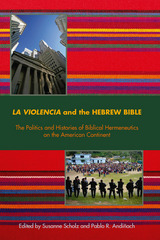
Exegetically noteworthy and culturally-theologically relevant
Violence in its wide range of horrifying expressions is real in people’s lives, and biblical interpreters must take violence in the world seriously to arrive at relevant ideas about the place of the Bible in the world. Each essay addresses people’s experiences of violence in the study of the Bible through the context of la violencia, the Spanish noun referring to the brutal, repressive, and murderous policies of state-sponsored violence practiced in many South and Central American and Caribbean countries during the twentieth century that external powers such as the USA often endorsed and fostered. The volume represents an important contribution to biblical studies and to the field of Latina/o studies. The contributors are Cheryl B. Anderson, Pablo Andiñach, Nancy Bedford, Lee Cuéllar, Steed V. Davidson, Serge Frolov, Renata Furst, Julia M. O’Brien, Todd Penner, José Enrique Ramírez, Ivoni Richter Reimer, and Susanne Scholz.
Features:
- Twelve essays by scholars living and working on the American continent
- Articles reveal the complex historical, political, and cultural conditions on the American continent that have contributed to our understanding of violence in the Bible
- Focus on themes of racial, social, and cultural violence

Relationships with land are fundamental components of Indigenous worldviews, politics, and identity. The disruption of land relations is a defining feature of colonialism; colonial governments and capitalist industries have violently dispossessed Indigenous lands, and have undermined Indigenous political authority through the production of racialized and gendered hierarchies of difference. Consequently, Indigenous resistance and visions for justice and liberation are bound up with land and land-body relationships that challenge colonial power. “Land back” has become a slogan for Indigenous land protectors across the Americas, reflecting how relations to land are foundational to calls for decolonization and liberation.
Land Back highlights the ways Indigenous peoples and anti-colonial co-resistors understand land relations for political resurgence and freedom across the Americas. Contributors place Indigenous practices of freedom within the particularities of Indigenous place-based laws, cosmologies, and diplomacies, while also demonstrating how Indigeneity is shaped across colonial borders. Collectively, they examine the relationships among language, Indigenous ontologies, and land reclamation; Indigenous ecology and restoration; the interconnectivity of environmental exploitation and racial, class, and gender exploitation; Indigenous diasporic movement; community urban planning; transnational organizing and relational anti-racist place-making; and the role of storytelling and children in movements for liberation.
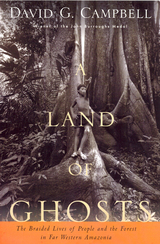
For thirty years David G. Campbell has explored the Amazon, an enchanting terrain of forest and river that is home to the greatest diversity of plants and animals to have ever existed, anywhere at any time, during the four-billion-year history of life on Earth.
With great artistic flair, Campbell describes a journey up the Rio Moa, a remote tributary of the Amazon River, 2,800 miles from its mouth. Here he joins three old friends: Arito, a caiman hunter turned paleontologist; Tarzan, a street urchin brought up in a bordello; and Pimentel, a master canoe pilot. They travel together deep into the rainforest and set up camp in order to survey every woody plant on a two-hectare plot of land with about as many tree species as in all of North America.
Campbell introduces us to two remarkable women, Dona Cabocla, a widow who raised six children on that lonely frontier, and Dona Ausira, a Nokini Native American who is the last speaker of her tribe's ages-old language. These pioneers live in a land whose original inhabitants were wiped out by centuries of disease, slavery, and genocide, taking their traditions and languages with them. He explores the intimate relationship between the extinction of native language and the extirpation of biological diversity. "It's hard for a people to love a place that is not defined in words and thus cannot be understood. And it's easy to give away something for which there are no words, something you never knew existed."
In elegant prose that enchants and entrances, Campbell has written an elegy for the Amazon forest and its peoples-for what has become a land of ghosts.
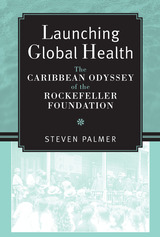
"With a clear and engaging narrative that delves into complex and debatable issues and, at the same time, tells very entertaining stories, this book is a wonderful addition to the historiography of international health."
---Diego Armus, Swarthmore College
From the Rockefeller Foundation to the Bill and Melinda Gates Foundation, U.S. philanthropies have played a leading role in the evolution of international health. Launching Global Health examines one of the earliest of these initiatives abroad, the Rockefeller Foundation's International Health Board. The flagship agency made its first call in British Guiana in 1914 to experiment with its new "American method" for the treatment of hookworm disease. Within months it was involved in ambitious hookworm programs in six Central American and Caribbean sites, its directors self-consciously choosing to test run the prototype for their global project in the nearest and clearest domain of American imperial influence. These efforts continued until 1930, when most of the International Health Board hookworm campaigns had evolved into public health projects of a different nature.
Launching Global Health is the first book to explore the inaugural Rockefeller Foundation campaigns in depth and to treat them as an ensemble---as a laboratory for discovering and testing the elements of a global health system for the twentieth century. Orienting the study according to the priorities and perspectives of the social and cultural history of medicine and marrying the results with social science and institutional approaches, Steven Palmer rediscovers elements and dynamics in the original history of global health that were either discarded or that have continued to operate beneath the radar of scholarship.
In particular, Palmer examines the extraordinary encounters that took place between the Rockefeller proselytizers of biomedicine and public health and the diverse populations whom they were attempting to help. Launching Global Health devotes special attention to the health narratives and practices of laboring people of different ethnicities and how they clashed and blended with the stories and rituals being promoted by the Rockefeller Foundation, ultimately showing the locally assembled health teams of microscopists, inspectors, and dispensers to have been active agents in the shaping of encounters between imperial and popular medicine.
Steven Palmer is Canada Research Chair in the History of International Health at the University of Windsor and author of From Popular Medicine to Medical Populism: Doctors, Healers, and Public Power in Costa Rica, 1800-1940.
Illustration: Lecture on hookworm disease on public building porch. Courtesy Rockefeller Archive Center.
A volume in the series Conversations in Medicine and Society.
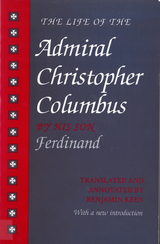
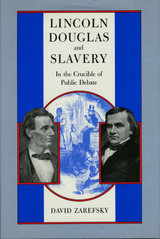
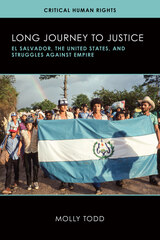
Drawing on two decades of work with former refugees from El Salvador as well as unprecedented access to private archives and oral histories, Molly Todd’s compelling history provides the first in-depth look at “grassroots sistering.” This model of citizen diplomacy emerged in the mid-1980s out of relationships between a few repopulated villages in Chalatenango, El Salvador, and US cities.
Todd shows how the leadership of Salvadorans and left-leaning activists in the US concerned with the expansion of empire as well as the evolution of human rights–related discourses and practices created a complex dynamic of cross-border activism that continues today.

Offering new and fascinating insights into the cast of characters who created a homegrown socialist movement in America—from Thomas Paine’s revolution to Robert Owen’s utopianism, and from Thomas Skidmore’s agrarianism to George Henry Evans’s industrial workers’ reforms—Long Road to Harpers Ferry captures the spirit of the times. Showing how class solidarity and consciousness became more important to a generation of workers than notions of American citizenship, the book offers a fascinating historical background to help us understand the rise of radicalism in the United States today.
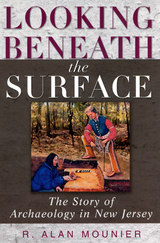
For more than ten thousand years, humans have lived in New Jersey. From Summit to Cape May, from Trenton to the Jersey Shore, the state is a treasure trove of archaeological artifacts, revealing much about those who occupied the region prior to European settlement. As a rule, only the most durable of human creations¾items of stone and pottery¾survive the ravages of time. To complicate matters, the onslaught of our own culture and the indiscriminate looting of sites by greedy collectors have further diminished the cultural materials left behind. The task of the archaeologist is to gather and interpret these scraps for the benefit of science and the public. But digging up relics is a trivial pursuit if the only outcome is a collection of artifacts, however attractive or valuable they may be. Understanding what those relics mean in human terms is crucial.
In Looking beneath the Surface, R. Alan Mounier looks at the human past of New Jersey. With particular focus on the ancient past and native cultures, the author tells the story of archaeology in the state as it has unfolded, and as it continues to unfold. New investigations and discoveries continually change our views and interpretations of the past. In jargon-free language, Mounier provides an in-depth introduction offering information to understand general archaeological practices as well as research in New Jersey. Subsequent chapters describe artifact types, archaeological settlements, and burial practices in detail. He concludes with vignettes of twenty-one archaeological investigations throughout the state to illustrate the variability of sites and the accomplishments of dedicated archaeologists, both professional and amateur.
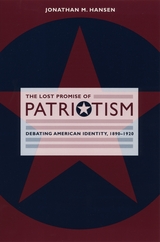
Intellectuals such as William James, John Dewey, Jane Addams, Eugene V. Debs, and W. E. B. Du Bois repudiated liberalism's association with acquisitive individualism and laissez-faire economics, advocating a model of liberal citizenship whose virtues and commitments amount to what Hansen calls cosmopolitan patriotism. Rooted not in war but in dedication to social equity, cosmopolitan patriotism favored the fight against sexism, racism, and political corruption in the United States over battles against foreign foes. Its adherents held the domestic and foreign policy of the United States to its own democratic ideals and maintained that promoting democracy universally constituted the ultimate form of self-defense. Perhaps most important, the cosmopolitan patriots regarded critical engagement with one's country as the essence of patriotism, thereby justifying scrutiny of American militarism in wartime.
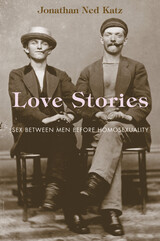
READERS
Browse our collection.
PUBLISHERS
See BiblioVault's publisher services.
STUDENT SERVICES
Files for college accessibility offices.
UChicago Accessibility Resources
home | accessibility | search | about | contact us
BiblioVault ® 2001 - 2024
The University of Chicago Press









